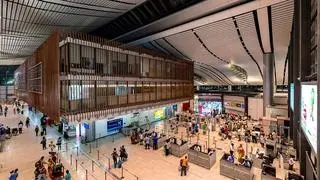More weight in the aircraft, more weight on the bottomline, and more wait for passengers at airports. In very many ways this sums up the impact of the horrific incidents in America on September 11, 2001.
Post the attack airlines were asked to install secure doors so that no unauthorised persons could enter the cockpit. The weight of the door, industry analysts point out, went up from about 3.6 kg in the pre-9/11 days to between 18 and 22.6 kg after the attacks.
This is an additional weight which airlines even in India had to bear. The cost of each door ranged from $25,000 to $50,000.
Airlines operating in India also have to pay a flight security handling charge. A bouquet of services for in-flight security includes basic checks or the more advanced ones including ladder point security checks. The costs for these services range between Rs 15,000 and Rs 50,000 per flight.
Worried security agencies in India also put in place ‘no fly zones' over the houses of the President, Prime Minister and other VVIPs. This means that an aircraft coming into and out of Delhi has to follow a circuitous route adding to flying time and fuel burn.
These are just a few of the additional costs that airlines have to bear post 9/11. How much of the additional financial burden the airlines are taking on themselves and how much they are passing on to customers is difficult to estimate, say industry analysts.
IATA points out that an area that India still needs to work on is Advance Passenger Information.
“While the Indian Government has committed to move towards a centralised API system that is based on internationally agreed messaging standard, the Government needs to ensure that this is implemented accordingly by the various Government agencies involved,” a senior IATA official said.








Comments
Comments have to be in English, and in full sentences. They cannot be abusive or personal. Please abide by our community guidelines for posting your comments.
We have migrated to a new commenting platform. If you are already a registered user of TheHindu Businessline and logged in, you may continue to engage with our articles. If you do not have an account please register and login to post comments. Users can access their older comments by logging into their accounts on Vuukle.